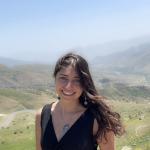Support
Standing in front of Mount Ararat, during my trip to Armenia in 2022, I set out to
research how war and displacement impact Armenian’s health. As an Armenian-American
whose family fled from the Armenian Genocide of 1915, I live as a member of the Armenian
diaspora, far removed from my homeland, yet deeply connected to my culture. When the war
against Artsakh in 2020 began, I was devastated. I did not know much about the situation, having
only learned bits and pieces from my trip to Artsakh in 2016 and reading articles, but I was
shook to my core. Like so many other Armenians around the globe, I feared for my people. It
was the first official war against Armenians during my lifetime.
When a war occurs, it impacts the whole community – the veterans, the families who’s
relative died, is missing, or is a prisoner of war, those who were displaced, the healthcare and
humanitarian workers who support these people, those living in the country, and those in the
diaspora. I decided I wanted to speak with activists in Armenia who support those who
experience war and displaced people to gain an understanding of what these communities
experienced and are currently experiencing today. So often, war outside of Europe and the U.S.
region is dismissed as normal and on-going, attributing this external structure as inherent to the
people who live there and the place they live. However, turning a blind eye means we are not
acknowledging these people’s reality, their experiences of trauma, and their need for multitudes
of community healing, care, and support, just as we all need at different points in our lives. It
also purposefully ignores the influence of global powers in causing and perpetuating these
conflicts to fulfill their economic interests over prioritizing the lives of the people living there
and their health. Finally, it fails to realize how war has a multitude of not widely known or seen
impacts on people that extends far beyond deaths and infrastructure destruction.
After conducting my interviews with Armenian activists who support those experiencing
war and displacement, I wanted to create a documentary in order to share these narratives with
people who might not have experienced these phenomena and have been misinformed or are
unaware of the gravity of the situation. I am working on this project currently in my Senior Year
Experience with Dr. Collins, creating a script and editing clips together. I am also researching
more about the effects of war and displacement in places near Armenia in the last 50 years, how
they affect health, and how the war in Artsakh specifically impacted people’s health. This project
has helped me shape the way I conceptualize global structures and health, which benefit my
multi-field major, Global Public Health, immensely. I have learned that war and displacement
are current, global, on-going, generational, traumatic, and complex issues that impact people’s
health, identity, relationship to the world, perception of time, and interactions with space. Above
all, we must recognize the people who feel the effects of displacement and war and their
experiences, even if we cannot see the impacts ourselves.
